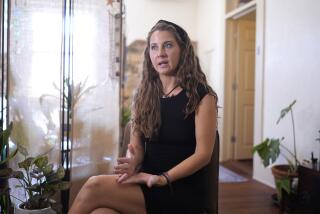The choice: Her life or her unborn child’s?
- Share via
She leaned on her husband, using his strength to hide her unsteadiness. Her steps were tentative, measured, cautious, with her gait more typical of a woman decades older than her late 20s. She could still walk, shake hands and almost smile, at least with one side of her mouth; she couldn’t let the tumor take those gifts away -- not yet. She had to stay healthy another few weeks, until her baby was born.
The father-to-be gently guided his wife into her chair, helped her adjust her sari and, still clutching her hand, eased into the seat next to her. The neurosurgeon waited for us all -- oncologist, neurologist, obstetrician, pediatricians -- to be seated, before giving a brief update on his patient’s diagnosis: astrocytoma, an aggressively malignant cancer of the brain.
For the neurosurgeon, the verdict was clear: An immediate operation was needed to remove the growing tumor. The invasive and complicated surgery -- under many hours of general anesthesia -- was likely to greatly increase the risk of fetal injury or death.
I couldn’t keep my eyes off the mother-to-be’s burgeoning belly. My mind struggled for alternatives: Could we not deliver the baby by C-section as soon as possible so she could have neurosurgery?
But as a pediatric resident working in the neonatal intensive care unit (NICU), I was sadly aware that -- at the time -- few infants younger than 28 weeks or weighing less than 2 pounds typically survived. This woman was 24 weeks pregnant, and her baby weighed only a little over a pound.
The oncologist said that if the surgery were delayed until the child was ready for life outside the womb, the cancer would probably be untreatable. The obstetrician said that if the mother-to-be agreed to the recommended surgery and subsequent chemotherapy, the fetus was unlikely to survive. The woman was faced with a heartbreaking choice -- her own survival or her child’s.
The young couple spoke quietly to each other in their native language for a few minutes as the specialists waited. Even I, who had chosen to study pediatrics because I loved children, reluctantly acknowledged that the woman’s care was the medical priority. Wouldn’t I -- wouldn’t everyone? -- opt for life-saving intervention for myself? Wouldn’t we all yield to the natural instinct to survive?
The young woman’s voice was firm as she turned back to the specialists. She wanted to delay surgery for four weeks, until after her baby could be born with the odds in its favor.
Even a discussion of the risks of aggressive brain cancer, such as brain swelling and seizures, couldn’t dissuade the woman. Appeals to her worried husband were unproductive -- despite his obvious pain, he vowed to follow her wishes. Her doctors finally acceded and directed their efforts toward keeping her as healthy as medically possible for as long as they could. I found myself awed at her sacrifice.
A couple of weeks later, the woman was admitted to the hospital for the predicted brain swelling. Her oncologist, neurologist and neurosurgeon began treating her with steroids, and her obstetrician monitored the fetus’ level of oxygenation and nutrition.
She fell into a coma several days later; her husband, ignoring his exhaustion, remained ever-present at her side. The doctors once again recommended delivery -- at 27 weeks, the fetus might have a chance of survival, and the woman could be rushed to neurosurgery. The father-to-be listened politely but, as his wife had asked, stayed the course. We were to try to keep her stable for one more week, so their baby could reach the 2-pound target weight.
To our astonishment -- and joy -- the comatose woman “hung in” until the 28th week. At that point, an ultrasound showed the fetus was probably over the 2-pound mark, and her doctors scheduled the caesarean. Gasping for air, the child was born at a size and weight that would give her a fighting chance of life.
Over the next few days, the new father divided his time between the bedsides of his wife and his daughter. Neurosurgeons removed much of the mother’s brain tumor, and the woman regained consciousness within a day. Her tiny girl did develop lung and gastrointestinal conditions -- common to extremely premature infants -- but responded to treatment and continued to grow.
One morning, a week later, I was overjoyed to see the young woman, her head shaved and bandaged, make her way into the NICU and approach her baby’s incubator, step by careful step as she leaned on her husband’s arm. After tenderly gazing at the tiny girl, she reached in to stroke her baby’s soft, thin skin. Her hand inched toward her daughter’s. The baby responded by clasping her mother’s outstretched finger, bringing tears to her parents’ eyes -- and ours. The new parents didn’t need to know that the grasp was an involuntary reflex; to the young mother, it was a sign that her baby had felt her love.
The baby spent two months in the NICU before doctors were reassured that she could be safely released to her waiting nursery, along with an optimistic prognosis for normal growth and development.
Unfortunately, cancer treatments didn’t achieve a miracle for her mother, who never left the hospital. She passed away two weeks before her child was ready to go home.
On the day of his daughter’s discharge, the father shared his tears with me in the NICU. He was grateful to us all, he proclaimed as he cradled his swaddled daughter tightly in his arms. She looks so very much like my wife, he added with pride. I gave a silent thanks for her miraculous survival where it was due -- to her mother.
--
Chassiakos is director of the Klotz Student Health Center at Cal State Northridge and an assistant clinical professor of pediatrics at UCLA.






